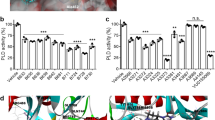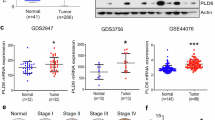Abstract
Abstract Phospholipase D (PLD) plays an important role as an effector in a variety of physiological processes that reveal it to be a member of the signal transducing phospholipases. Recently, PLD2 was reported as a necessary intermediate in preventing apoptosis induced by hydrogen peroxide or hypoxia in rat pheochromocytoma (PC12) cells. The data presented here show that both PLD isozymes, PLD1 and PLD2 are also required in attenuating glutamate-induced cell death in PC12 cells. Treatment of PC12 cells with glutamate resulted in induction of apoptosis in these cells, which is accompanied by decreased PLD activity and increased ceramide concentration. Incubation of PC12 cells with exogenous C6-ceramide showed a time-dependent decrease of PLD activity. When cDNAs of PLD1 and PLD2 were transfected into PC12 cells respectively, overexpression of PLD1 or PLD2 resulted in inhibition of glutamate-induced apoptotic cell death. These data indicate that both PLD1 and PLD2 play a protective role against glutamate-induced cell death in PC12 cells.
Similar content being viewed by others
Article PDF
Author information
Authors and Affiliations
Rights and permissions
This is an Open Access article distributed under the terms of the Creative Commons Attribution Non-Commercial License (http://creativecommons.org/licenses/by-nc/3.0/) which permits unrestricted non-commercial use, distribution, and reproduction in any medium, provided the original work is properly cited.
About this article
Cite this article
Kim, KO., Lee, KH., Kim, YH. et al. Anti-apoptotic role of phospholipase D isozymes in the glutamate-induced cell death. Exp Mol Med 35, 38–45 (2003). https://doi.org/10.1038/emm.2003.6
Published:
Issue date:
DOI: https://doi.org/10.1038/emm.2003.6
Keywords
This article is cited by
-
Inhibition of phospholipaseD2 increases hypoxia-induced human colon cancer cell apoptosis through inactivating of the PI3K/AKT signaling pathway
Tumor Biology (2016)
-
Phospholipase D1 Increases Bcl-2 Expression During Neuronal Differentiation of Rat Neural Stem Cells
Molecular Neurobiology (2015)
-
Ischemic preconditioning upregulates expression of phospholipase D2 in the rat hippocampus
Acta Neuropathologica (2007)



